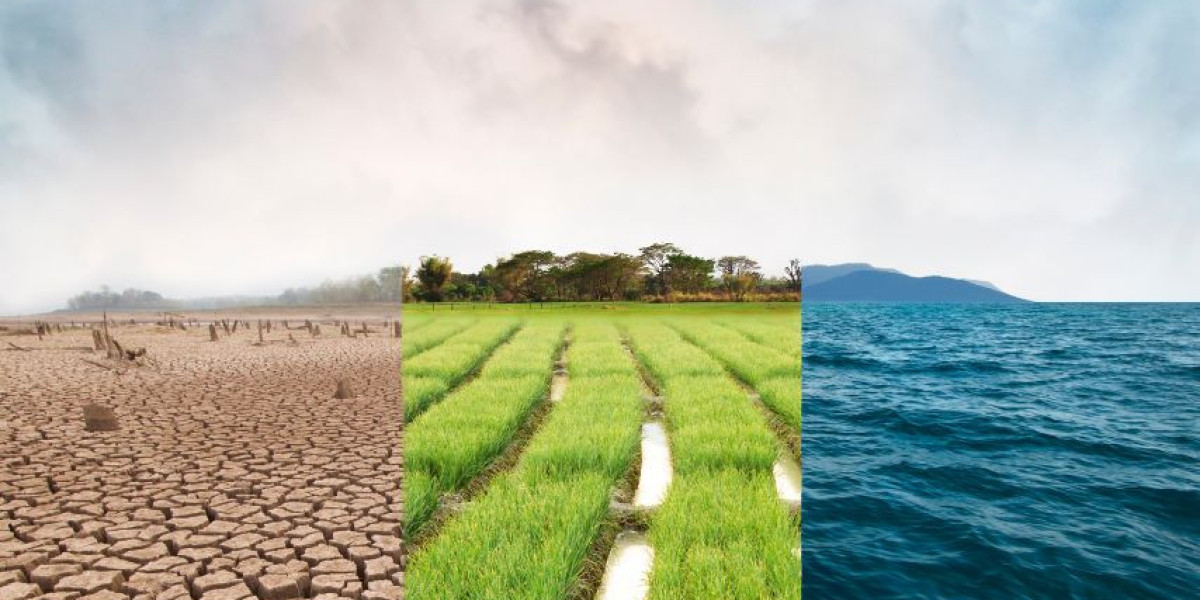Did you know that Malaysia is projected to face a temperature increase of up to 6°C by the end of this century? The role of environmental consulting in Malaysia's climate adaptation and resilience planning is crucial now more than ever. Environmental consultants play a vital part in navigating the complex landscape of climate change impacts, helping businesses and communities develop sustainable strategies to mitigate risks and adapt to a changing environment. By providing expertise in areas such as environmental impact assessments, sustainable development, and regulatory compliance, environmental consultants are instrumental in shaping a resilient future for Malaysia.
Understanding Malaysia's Climate Challenges
Rising Sea Levels
Malaysia faces significant challenges due to rising sea levels. Coastal areas are increasingly vulnerable to flooding and erosion, posing a threat to infrastructure and communities. The rise in sea levels is primarily attributed to global warming and the melting of polar ice caps.
Impact on Biodiversity Climate change in Malaysia has a profound impact on biodiversity. The country's rich ecosystems are at risk due to changing temperatures and weather patterns. This threatens various plant and animal species, leading to disruptions in the natural balance.
Increased Flooding
Increased flooding is another pressing challenge for Malaysia. Heavy rainfall and inadequate drainage systems exacerbate the risk of floods, especially in urban areas. This poses dangers to public health, property, and agriculture, impacting livelihoods.
Socio-Economic Implications The socio-economic implications of climate challenges are severe for vulnerable communities in Malaysia. Farmers face crop failures due to unpredictable weather patterns, while coastal residents grapple with the loss of homes and livelihoods. These challenges deepen existing inequalities and push communities further into poverty.
Importance of Environmental Consulting
Assessing Climate Risks
Environmental consultants play a crucial role in assessing climate risks and vulnerabilities in Malaysia. They conduct thorough evaluations to identify potential threats posed by climate change, such as rising sea levels, extreme weather events, and changing precipitation patterns. By analyzing these risks, consultants provide valuable insights that help stakeholders develop proactive strategies to mitigate the impact of climate change.
Supporting National Adaptation Plans (NAPs)
Environmental consulting is instrumental in supporting the development of effective National Adaptation Plans (NAPs) in Malaysia. Consultants work closely with government agencies, policymakers, and local communities to assess current vulnerabilities and formulate comprehensive adaptation strategies. These plans outline specific actions to enhance resilience against climate change impacts, ensuring sustainable development and safeguarding the environment for future generations.
Integrating Climate Adaptation into Policies
Expert guidance from environmental consultants is essential for integrating climate adaptation into local and national policies. Consultants offer specialized knowledge and technical expertise to policymakers, enabling them to incorporate climate considerations into various sectors such as urban planning, agriculture, and infrastructure development. By integrating climate adaptation measures into policies, Malaysia can build a more resilient and sustainable future that prioritizes environmental protection and community well-being.
Collaborative Strategies for Climate Resilience
Partnerships
Partnerships between government, NGOs, and the private sector play a crucial role in enhancing climate resilience efforts. By working together, these entities can pool resources, expertise, and networks to tackle complex environmental challenges.
Knowledge Sharing
Encouraging knowledge sharing and capacity building through collaborative workshops and training sessions is essential for strengthening climate resilience. These initiatives help disseminate best practices, innovative solutions, and scientific findings across different sectors.
Community Involvement
Advocating for community involvement in creating localized climate adaptation strategies empowers local populations to take ownership of their resilience measures. When communities are actively engaged in the planning process, they can provide valuable insights based on their unique experiences and needs.
Effective Climate Adaptation Approaches
Innovative Technologies
In Malaysia, innovative technologies play a crucial role in mitigating climate impacts and enhancing environmental consulting efforts. Utilizing advanced tools like Geographic Information Systems (GIS) enables precise mapping of vulnerable areas prone to flooding or erosion. This data helps in developing targeted adaptation strategies to protect these regions effectively.
Assessment of Existing Measures
Evaluating the effectiveness of current climate adaptation measures is essential for identifying strengths and weaknesses in Malaysia's resilience planning. By conducting thorough assessments, environmental consultants can pinpoint areas that require improvement and prioritize actions to enhance overall climate resilience.
Adaptive Management Strategies
Implementing adaptive management strategies is key to fostering flexibility in response to changing climate conditions. These strategies involve continuous monitoring, evaluation, and adjustment of adaptation measures based on real-time data and feedback. By remaining adaptable, Malaysia can better address evolving climate challenges and ensure sustainable development practices.
Role of Consultants in Adaptation
Conducting Assessments
Best environmental consultants play a crucial role in conducting climate vulnerability assessments to identify risks and vulnerabilities. They analyze data to assess the potential impact of climate change on various sectors.
Consultants use specialized tools and models to evaluate the susceptibility of ecosystems, infrastructure, and communities to climate-related hazards. By conducting thorough assessments, they provide valuable insights for developing effective adaptation strategies.
Facilitating Engagement
Consultants facilitate stakeholder engagement and public participation in climate adaptation and resilience planning. They organize workshops, meetings, and focus groups to gather input from diverse stakeholders.
Through inclusive processes, consultants ensure that the concerns and perspectives of all stakeholders are considered in decision-making. This collaborative approach enhances the legitimacy and effectiveness of adaptation initiatives.
Monitoring and Evaluation
Ongoing monitoring and evaluation conducted by consultants are essential to track the progress and effectiveness of adaptation measures. They establish monitoring frameworks to assess the implementation of adaptation strategies.
Community Engagement in Resilience Planning
Importance of Engagement
Engaging local communities is crucial in resilience planning to ensure that strategies address their specific needs. By involving residents, planners can gather valuable insights on vulnerabilities and build trust.
Community input helps identify unique challenges faced by different groups within a community, leading to more targeted and effective adaptation measures. This inclusive approach fosters ownership and commitment to long-term resilience goals.
Participatory Approaches
Utilizing participatory methods such as workshops, focus groups, and surveys allows for meaningful dialogue with community members. These approaches empower individuals to share their experiences and knowledge, contributing to context-specific solutions.
Engagement activities should be tailored to the local context, taking into account cultural norms and communication preferences. By fostering open communication channels, planners can ensure that all voices are heard and respected.
Case Studies
Kuala Lumpur Flood Mitigation Project: Involving residents in the planning and implementation of flood mitigation measures led to increased community awareness and cooperation. As a result, the project achieved greater success in reducing flood risks.
Penang Green Agenda: Through extensive engagement with local stakeholders, the Penang state government developed a comprehensive sustainability plan. This collaborative effort resulted in the adoption of innovative green practices and improved resilience to climate impacts.
Benefits of Community Engagement
Enhanced Resilience: Engaging communities increases the effectiveness of resilience strategies by addressing local priorities and concerns.
Improved Sustainability: Local involvement promotes the adoption of sustainable practices that benefit both the environment and residents.
Social Cohesion: Collaborative planning builds stronger bonds within communities, fostering a sense of unity and shared responsibility.
Data-Driven Decision Making
Reliable Data
Environmental consulting in Malaysia plays a crucial role in advocating for reliable data and analytics to shape climate adaptation strategies. By utilizing accurate data, stakeholders can make well-informed decisions that have a positive impact on the environment.
Utilizing historical climate data and predictive modeling allows experts to anticipate future challenges and develop proactive solutions. This approach enables policymakers to implement measures that effectively mitigate the impacts of climate change.
GIS and Remote Sensing
The significance of Geographic Information Systems (GIS) and remote sensing technologies cannot be overstated in identifying vulnerable areas for climate adaptation and resilience planning. These tools provide detailed spatial information that helps pinpoint regions at high risk of environmental degradation.
By analyzing satellite imagery and geospatial data, environmental consultants can identify areas prone to flooding, deforestation, or other environmental hazards. This information is invaluable in developing targeted strategies to protect these vulnerable areas and enhance their resilience.
Data-Sharing Platforms
Encouraging the establishment of data-sharing platforms among stakeholders is essential for fostering informed decision-making processes. When different organizations share their data and insights, it creates a collaborative environment where comprehensive solutions can be developed.
Through open data sharing, communities, government agencies, and environmental experts can work together to address complex environmental challenges. This collaborative approach ensures that decisions are based on a holistic understanding of the issues at hand, leading to more effective climate adaptation strategies.
Nature-Based Solutions for Resilience
Benefits of Nature-Based Solutions
Enhancing climate resilience through nature-based solutions offers numerous benefits. These approaches leverage natural ecosystems to provide sustainable solutions, reducing vulnerability to climate change impacts. By utilizing nature-based solutions, communities can enhance their adaptive capacity while promoting biodiversity conservation.
Nature-based solutions help mitigate the effects of climate change by harnessing the natural processes and services provided by ecosystems. For instance, reforestation projects can help sequester carbon dioxide, mitigating greenhouse gas emissions. Wetland restoration efforts not only improve water quality but also reduce flood risks in vulnerable areas.
Examples in Malaysia
In Malaysia, various nature-based solutions have been implemented to enhance climate resilience. Reforestation initiatives aim to restore degraded forests and protect biodiversity. Mangrove rehabilitation projects along coastal areas serve as natural barriers against storm surges and erosion, safeguarding communities and ecosystems.
Wetland restoration plays a crucial role in Malaysia's climate adaptation strategies. By restoring degraded wetlands, the country enhances its water storage capacity, reduces flood risks, and provides habitats for diverse species. These initiatives demonstrate the effectiveness of integrating nature-based solutions into climate resilience planning.
Integration of Biodiversity Conservation
The integration of biodiversity conservation into climate adaptation planning is essential for building long-term resilience. Protecting and restoring ecosystems not only helps mitigate climate impacts but also supports the preservation of species diversity. This holistic approach ensures that climate adaptation measures benefit both people and nature.
Pros of Nature-Based Solutions:
- Sustainable and cost-effective
- Enhances ecosystem services
- Promotes community engagement
Conservation Integration Benefits:
- Supports ecosystem health
- Enhances ecosystem resilience
- Contributes to sustainable development
Building Partnerships for Sustainability
Multi-Sectoral Collaboration
Environmental consulting plays a crucial role in Malaysia's climate adaptation and resilience planning by fostering multi-sectoral partnerships. These collaborations bring together government agencies, non-profit organizations, and private sector entities to work towards common sustainability goals. By leveraging the expertise and resources of various sectors, environmental consultants can develop comprehensive strategies to address climate challenges.
Collaborating across sectors allows for a more holistic approach to climate adaptation and resilience planning. For example, when local governments partner with academic institutions and community organizations, they can access a diverse range of perspectives and knowledge. This diversity of input leads to more robust and effective solutions that consider the needs of all stakeholders involved.
Resource Mobilization
In Malaysia, partnerships between local governments and international organizations are essential for resource mobilization. International organizations often provide funding, technical expertise, and best practices to support climate adaptation projects in the country. By collaborating with these entities, Malaysia can access additional resources that may not be available domestically.
Moreover, partnerships with international organizations facilitate knowledge exchange and capacity building. For instance, when local environmental consulting firms work with global NGOs, they can learn about successful strategies implemented in other countries. This knowledge transfer enhances Malaysia's ability to develop innovative solutions tailored to its unique climate challenges.
Driving Innovation through Public-Private Partnerships
Public-private partnerships (PPPs) have the potential to drive innovation in climate adaptation initiatives in Malaysia. By bringing together government agencies, private companies, and civil society organizations, PPPs can harness the strengths of each sector to develop cutting-edge solutions. For example, a collaboration between a government agency, a technology firm, and a local community group could lead to the creation of a sustainable urban planning tool that enhances resilience to extreme weather events.
PPPs also enable faster implementation of climate adaptation projects by streamlining decision-making processes and resource allocation. When different sectors pool their resources and expertise, they can overcome bureaucratic hurdles and expedite the development of sustainable infrastructure. This accelerated pace of implementation is critical in addressing urgent climate challenges facing Malaysia.
Summary
Environmental consulting plays a crucial role in Malaysia's climate adaptation and resilience planning. By understanding the country's climate challenges, the importance of consulting, collaborative strategies, effective adaptation approaches, consultant roles, community engagement, data-driven decision-making, nature-based solutions, and building partnerships for sustainability, you are equipped with the knowledge to drive positive change. Embracing these concepts not only enhances environmental sustainability but also fosters a resilient future for Malaysia. Take action by advocating for sustainable practices, engaging with consultants, supporting community initiatives, and promoting data-informed decisions to contribute to Malaysia's climate resilience and adaptation efforts.








